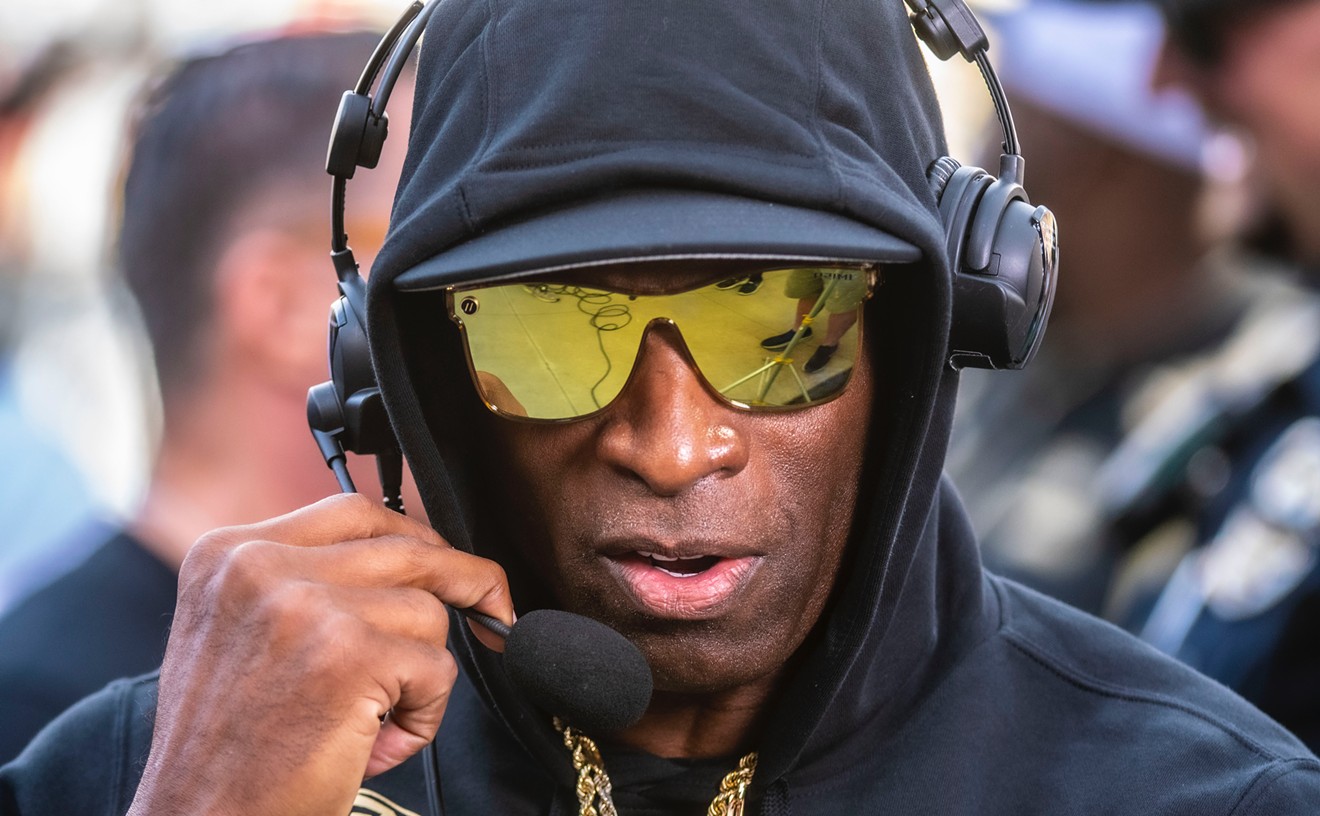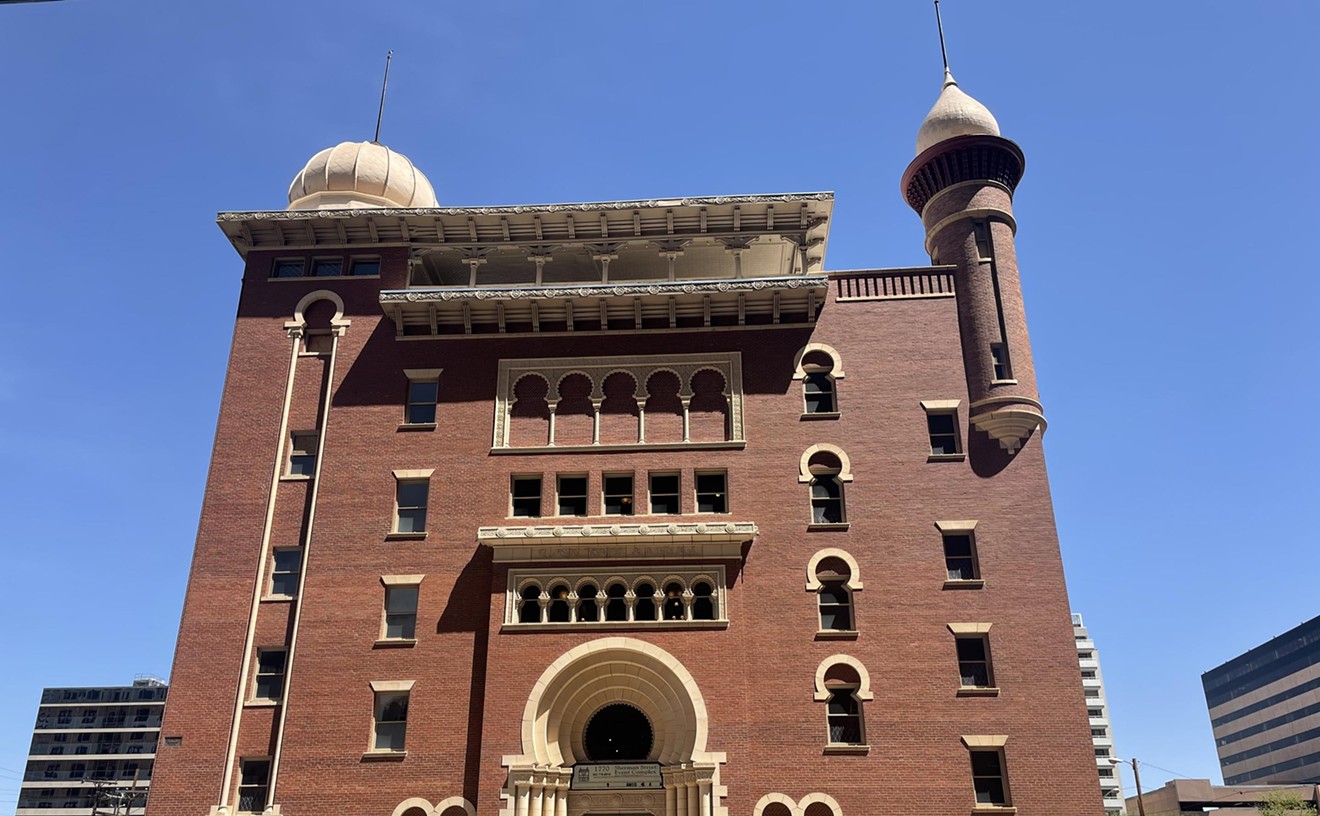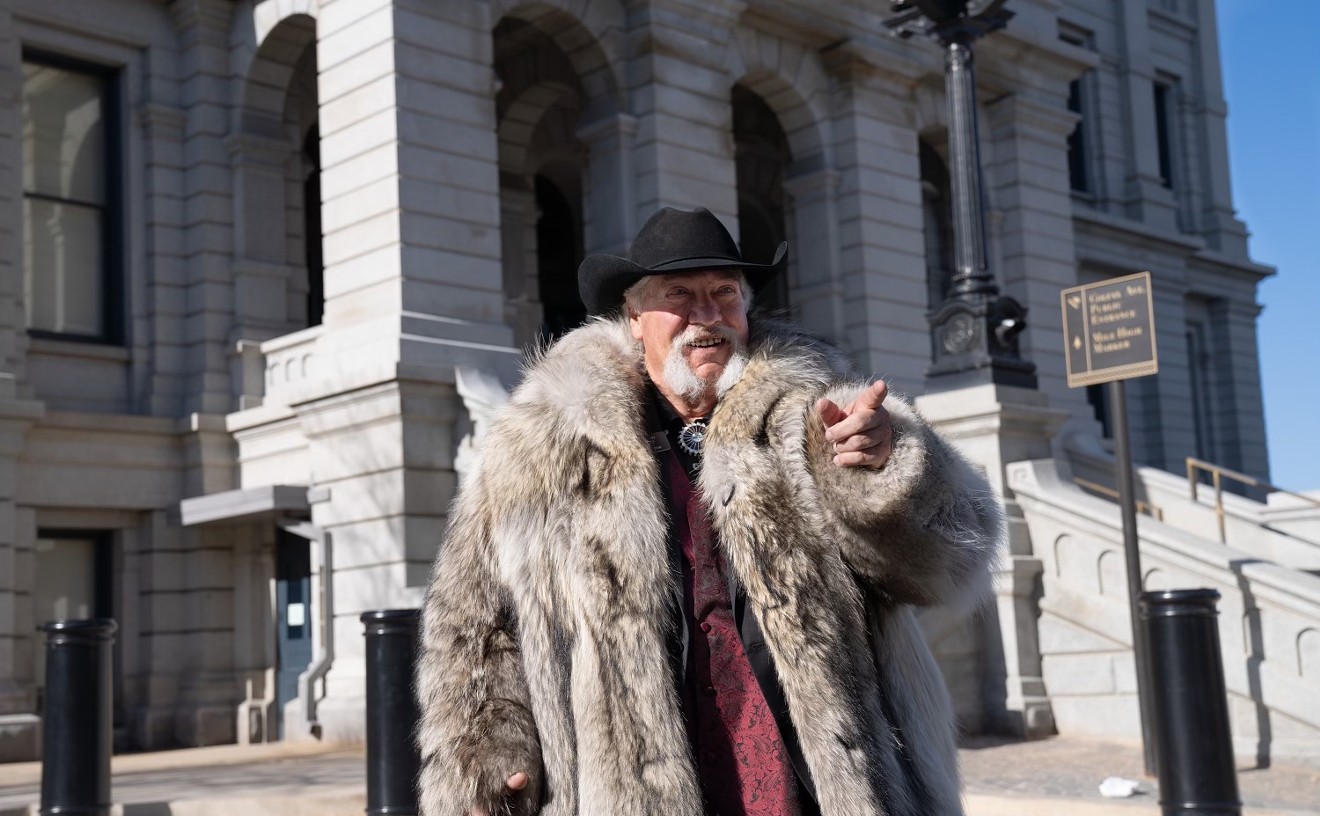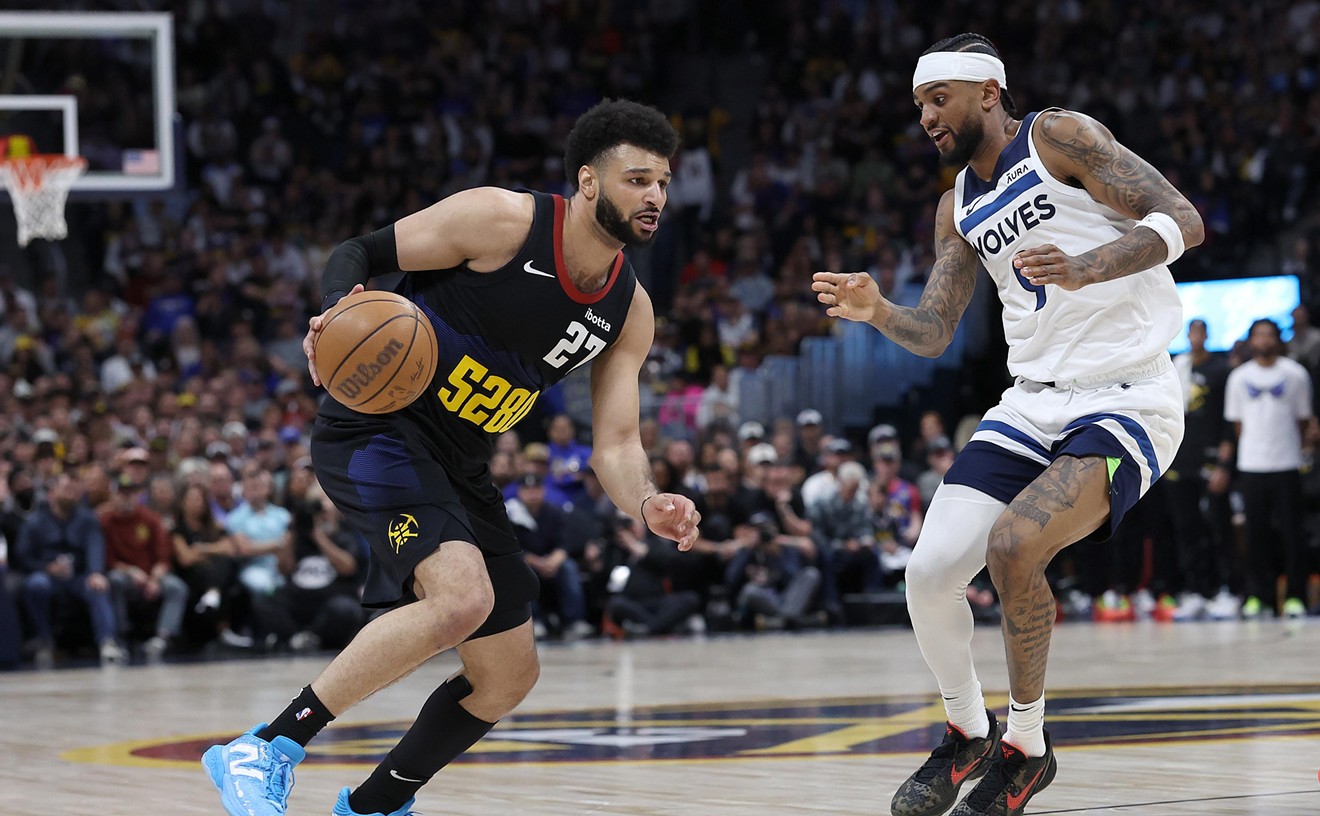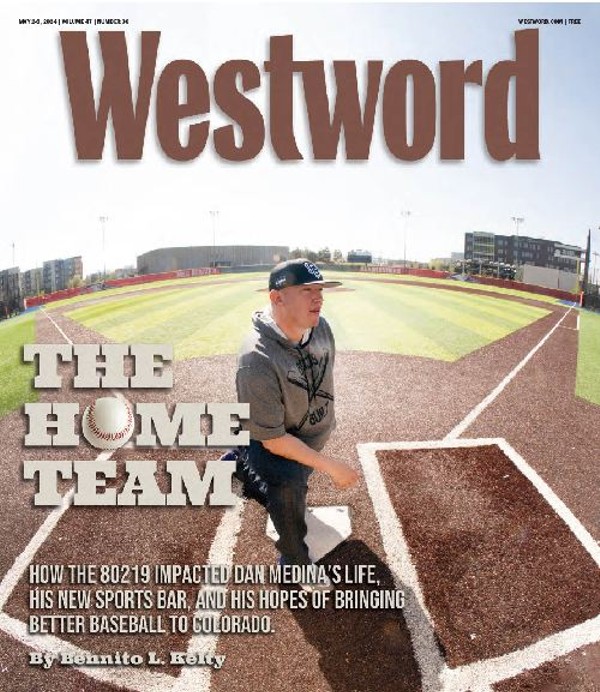The audience laughs, giving me a momentary sense of relief. Why did I have to wear a T-shirt? I've got the pit stains of a goddamn disc jockey up here. The stage lights aren't bright -- half the comics who've been up tonight looked like they were standing in the shadows -- but they feel like they're burning my soul. My knees are shaking. It's not smart to lock them in place, but if I don't, I'm going to hit the floor any second.
"It's fun," I continue. "It's like a race for them, a race to the finish. I always tell my dad, 'Dad, are you sure you want that steak rare? Wouldn't preserving your ancestor's legacy be a lot more satisfying?'"
More laughter. This is good; this is good. Start the next bit, now. Oh, God, what's the next bit? Okay, don't panic; just stare at the floor, wait for the laughter to subside. It's all part of the act, folks, nothing out of the ordinary. Shit, still nothing.
No, wait, I've got it!
"You ever notice how every actor reaches a point in their career where they feel they have to play a retarded person?" I do my best to look calm and collected; people in the audience smile and wait for the punch line. I've still got four more minutes of material to get through.
At this point, I can say with the utmost certainty that I am the best unsigned comic in America. But did I pay my dues to get where I am today? You bet your sweet ass I did.
I've fought for everything I've gotten in this game. I've put all I have, my blood, sweat and tears, into building this career from the ground up. For nearly three months, three months, I've fought against all odds. There were weeks when I performed not just on a Monday night, but on a Tuesday night, too. There were times when I spent nearly 45 minutes -- in one sitting! -- working on my material at a coffee shop. There were entire nights sacrificed to staying up late and drinking with other comics in hopes of advancing my career.
Do these sound like the habits of someone who doesn't take this funny business seriously? Still, I know there are many naysayers out there who continue to dispute my indisputable talents. For those Doubting Thomases, I'm providing the following account of my meteoric rise through the universe of stand-up comedy.
Out on the piss one Saturday night, I met a guy named Ben Roy at a bar. While we were chatting, Ben told me that he was a stand-up comic. I've written humor most of my short life and am generally regarded as funny. Consequently, I became panic-stricken when it suddenly appeared possible that I wasn't the funniest person in the room. Two lacrosse players in a similar prowess-threatening situation would shed their shirts, grab their sticks and methodically bludgeon each other to death. But we were humorous people, accustomed to using more cerebral tools as weapons, so we earnestly and openly discussed our craft. I told him that I'd thought about routines to do on stage, but had never had the balls to try it. "Lion's Lair," he told me. "Monday nights."
The Next Monday, the Lion's Lair
I walk off East Colfax Avenue and into the Lion's Lair thinking I'm going to write a short story about open-mike night.
I'm fooling myself.
The open-mike segment is advertised as starting at ten, but it's well after eleven when the emcee grabs the mike. Then one comic after another takes the stage, each spouting off for several minutes. Some read from notebooks, immediately scratching out jokes that fail to get a laugh; some bring hilarious, polished routines. Between performances, they huddle together on one side of the bar, joking back and forth. Their manner is self-deprecating and playful, as if they can't believe they're all big enough assholes to show up at the Lair on another Monday night. But I know that deep down, every comic is proud of what he's doing and knows he's brave to be doing it.
The rest of the crowd is a mostly indifferent, grizzled assortment of alcoholics, hipsters and tragic nighthawks, all drowning their sorrows in the windowless bar. A few watch the comics, but most ignore them.
Still, for the comics, this night isn't about an attentive audience. It's about trying out jokes, gauging the response of the few people who are paying attention, creating and honing new material. It's comedy, pure and true, and I'm hooked. The next morning I wake up and write a routine.
The following Monday my career in comedy is born.
April 5, the Lion's Lair
I sign up with Troy Baxley, the emcee, the moment I walk into the Lair. Some of the comics recognize me from the week before, but none of them say anything. I take a seat at the bar and nervously suck back can after can of PBR. There's another comedy virgin here, a kid from Fort Collins with long hair and sideburns. We talk about going up on stage for the first time. Even though he doesn't have any material written or prepared, he's incredibly relaxed. I don't trust the hippie.
I've been going over my set incessantly for four days, and I still can't shake the feeling that I'm going to get up there and bomb. I'd decided not to take any notes with me so that I'd look more professional, and now I'm panicked that I won't remember anything. I envision a painful, drawn-out scene in which I take the stage and stare unblinking into the lights, saying nothing. As the audience begins to whisper, I pass out cold, smashing my face on the floor as I fall. I wake up the next morning in a gutter, sandwiched between an empty 40 and a bum named Herschel, with whom I'll spend the rest of my life designing clever signs to solicit cash and tirelessly canvassing the city for aluminum.
Troy taps me on the shoulder.
"You're up next," he says. "Try to keep it to five minutes. There's a lot of comics tonight."
I hover by the side of the stage, waiting for another comic to finish, compulsively going over the material in my head. I think about the last time I was on stage: my fourth-grade musical, 1920s: The Spotlight's on You. Christ almighty, that was in 1990! And even then, the teacher had the good sense not to give me many lines. Just that one about cheating at cards, and I still fucked it up.
"This is what open mike night's all about." Troy says, introducing me. "It's this guy's first time on stage, so be nice. It's fun to kick a puppy, but it's wrong."
I take the mike off the stand, start to speak and black out. When I come to, people are applauding and laughing, and I'm handing the mike back to Troy.
"That was your first time?" he asks over the mike. I nod my head.
"Christ, great job. My first time I was like this," Troy says, turning his back to the audience and telling a joke to the wall.
As I leave the stage, I get another round of applause. The other comics shake my hand and pat me on the back. The high is incredible. I feel untouchable, like I just climbed a fourteener. The bartender treats me to a beer.
"You should call and sign up for New Talent Night at the Comedy Works," one comic tells me.
"I should?"
"Yeah, it takes about six to eight weeks to get on, so you might as well call now. You'll be ready by the time it comes up. It's a two-minute set, in front of about 300 people."
A Rocky Mountain News reporter approaches and asks how to spell my name. She's doing an article on open-mike comedy nights around town and is following Troy around. (If I hadn't already abandoned the idea of doing my own piece, I would now -- thieving daily bastards.) I give her the spelling of my name and turn to watch the other first-time comic. He wanders aimlessly, painfully, drawing occasional chuckles from the audience.
After all the comics have performed, a few of the better ones gather around Troy, shooting the breeze. From my barstool, I watch the other first-timer make his way over. He's greeted amiably, then ignored. He hovers awkwardly at the group's perimeter for a few minutes, then walks away. Boldly, I make my way over to the same group. I'm greeted with open arms -- and just like that, I'm in. It's not the most exclusive club in the world, but there are rules: Laughter is the price of entry.
I stay at the bar until closing.
I call the Comedy Works the next day.
The News article comes out a few weeks later. It closes with a bit about me getting up on stage for the first time and getting a laugh. Despite the fact that I spelled my name for the reporter, and even though my first bit was about how shitty it is having a hyphenated last name, the piece refers to me as Adam Clayton-Holland.
Ah, fame.
April 26, the Lion's Lair
I've been going to the Lion's Lair every Monday this month, and things are going well. Each performance has been better than the last, and I've grown more comfortable on stage. I no longer black out, and I'm even able to remember what worked and what didn't.
"So will those CU football players learn to keep it in their pants already or what?" one joke begins. I mention an article I read describing the initial recruitment party, a party the reporter said "ended" in the alleged rape of three women.
"How does he know that's when the party ended? I ask. "This is a CU recruitment party we're talking about here; I'm pretty sure that's when the party was just getting started."
At first I hesitated to tell any of my friends about my stand-up career. But tonight I bring along my friend David, figuring it will be good to reveal the secret.
Performing, you quickly realize there are two types of comics: those who do their set and are normal everyday people afterwards, and those with no off switch. These are the comics to avoid. Their every word comes to you in monologue form, as if they are unable to stop. If one falls down and hurts himself, he can't just tell you that it was painful -- he has to act it out for you, drawing out the story to lamely epic proportions. If he's tired, he can't just say so -- no, he says he feels like "a prostitute after a dental convention." Good luck ending a conversation with a comic like this. Polite nods, bored looks, ordering another drink from the bartender -- none of these behaviors will distract him from his insane desire to play for you.
I've gotten to know several comics in the other group a little better. There's Andrew Orvedahl, with his joke about how it's only kind of okay to pee in the pool if you're actually in the pool. There's Greg Baumhauer, who bemoans the stupidity of a homeless man who tells him he has no place to sleep, offering this response: "Well, if you hadn't ripped up your cardboard box to make that sign, you'd have a place to sleep." There's Brian Hocker, who looks so natural on stage that it seems weird to see him at a place like the Lair. They're all down-to-earth and helpful and willing to tell you what does and doesn't work.
I've also befriended Troy, the emcee. He's been doing comedy for eleven years and is a writer as well, so the two of us have a lot to talk about.
Tonight Ben Roy shows up to perform for the first time since I've been doing standup at the Lair. Although I'm about four beers deep, it's quite clear that Ben is way ahead in the game. He takes the stage for a particularly drunken set and then hands the mike back to Troy.
"Thank you very much to the guy from Matchbox Twenty," Troy says, taking the obligatory shot -- this one a reference to Rob Thomas -- at the departing comic. Ben mutters something in response, and the assembled comics get ready for a clash between the comic who introduced me to the Denver game and the comic who gives me a chance every week -- the current pillars of my tiny comedy world. But then they both back off and step outside.
Of course, I'm up next. I work through a six-minute set about, among other things, the day they took the sound off the scrambled Spice Channel, generally referred to in my high school as "Black Sunday." It's passable, B-plus, but my friend David eats it up. He tells me that I rank at least in the top four of the comics out there tonight. Although he's an obviously biased source, it feels good to hear it.
Still no word from the Comedy Works.
May 10, the Lion's Lair
My friend Brett is visiting Denver. Since I went public with my stand-up career, he's been my long-suffering sounding board, patiently listening to jokes over the phone. He recently helped me craft a pretty solid new bit about the just-released photos of the prisoners at Abu Ghraib. Bush's response to the whole affair has been to say over and over again how disgusted he is. The only thing Bush is disgusted about, we joke, is that he was not there in person to participate. From there I imagine a fraternity initiation with Pledge Master Bush leading the charge, taking the prisoners on an elephant walk through downtown Baghdad. It's a good piece, and Brett and I have polished it into shape.
But as the two of us walk into the Lair tonight, I feel strangely nervous. I have the Bush stuff down cold, as well as a few other pieces I've written, but for some reason I'm panicking that things will go horribly. I've been up on stage six times now, and suddenly I'm more nervous than I was my first night -- middle-school formal, slow-dancing to "Wonderful Tonight" nervous. To settle myself, I leave and walk down an alley to a gravel parking lot hidden behind a strip of buildings. I do my routine out loud, word for word, pacing back and forth in tight circles. Right there, right then, I am without a doubt the craziest person on Colfax.
I'm still tense and anxious, sweating profusely, when I get up on stage. But after I take the mike in my hand, calm settles over me like a blanket. It feels natural; it feels right. I rip through the routine. The Bush bit works, despite my weak Southern accent. I close by asking, "How disgusted were you, Mr. Bush? As disgusted as when you were executing retarded fifteen-year-olds in Texas? Were you that disgusted?" The audience digs it, laughing and applauding at my first politically charged comic diatribe.
A woman opening a restaurant downtown later gives me her card, saying she wants to start a new open-mike night. Who opens restaurants and hangs out at the Lion's Lair?
Ben Roy puts in another appearance and does a classy, hilarious set about what transpired the last time he took the stage at the Lair, offering mock-drunk impersonations of himself. Everyone who was there that night doubles over.
Strange business, this stand-up comedy.
June 1, the Squire Restaurant and Lounge
Greg Baumhauer has started an open-mike night at the Squire, and tonight is the first night. The crowd is much larger than the usual gatherings at the Lair, and there's a definite buzz in the air. The bar is split into two rooms: a back space with booths where the stage is set up and the front bar area. You can barely hear the comedy from there; loud drinkers yell and play shuffleboard as the comics go on in back almost like an afterthought.
And that's good for me, since I take the stage and bomb.
Up until now, I've been almost eerily successful. I haven't had people rolling on the ground soiling themselves, but every time I've done comedy, people have laughed, often pretty hard, and I've left feeling good about what I had to offer. Not tonight. I get up there with a bit I wrote three hours ago about a haircut I'd gotten earlier in the day. I explain how the barber assaulted my head with his scissors, robbing me of seven months of hair growth. I tell of the subsequent corrective haircut and how I paid more than thirty bucks to receive the exact 'do I have in my thirteen-year-old baseball team photo. I liken myself to the injured crow that the other birds cruelly pluck apart. The audience stares at me, completely unamused. There is no laughter, no cry of agreement, not even a sympathetic chuckle. The clinking of ice in glasses roars over the silence.
Toward the end of my set, I save a little face with a top-ten list, but the damage is already done. I died up there.
After slinking off the stage, I picture myself walking out the door, heading to one of the nearby pawnshops, buying a gun, whispering "Mom, it wasn't your fault," and then putting myself out of my misery.
Instead, I take a seat at the bar and order a drink. I don't feel as bad as I think I should. In a way, this is a rite of passage: I can now say I got up on stage and absolutely blew. Every comedian does that once, right?
A comic named Dick Black sits down next to me. "Good set," he says.
"Yeah, right."
"Yeah," he says. "You bombed."
I explain to Dick how I've used completely new material each time I've gone on stage. Although the other comics will occasionally try out a new bit, you usually hear the same jokes every time. Everyone knows everyone else's material so well that they yell out requests during any moments of onstage indecision. So I've prided myself on bringing new stuff to the table.
"I used to be that way when I started," Dick tells me. "That's good; you have a lot to say. But you're never going to kill doing all new material. Not once."
He's right. I vow to bring my A game next week.
June 8, the Squire
As part of Greg's plan to have a different emcee every week, Ben is hosting tonight. He gives me a great introduction, telling people he's performed around town with me and that I'm a real funny guy.
I take the stage, let loose with my highlight reel and absolutely bury it. Standup has never gone like this for me before. I have to wait for the laughter to subside before I can begin my next joke -- there are long moments when I'm ready to go and the audience is still in hysterics. It's an incredibly powerful feeling. After a seven-minute set, I leave the stage to raucous applause, the last comic of the night.
Two professional touring comedians go out of their way to tell me I did a good job. A complete stranger buys me a shot. Then the bartender comes by with a tray of shots for the "talent" and we all toast each other, enjoying the last half-hour or so that the bar is open.
"When are you doing Comedy Works?" Ben asks.
"I call every week; they still won't put me up."
"You're up next week," another comic tells me. "I just called an hour ago; you're first on the list."
I take a moment to let the enormity of that statement sink in.
"Two minutes," Ben says, then lights a cigarette.
June 15, the Comedy Works
New comics are to report to the Comedy Works at 7:30 p.m. At 7 p.m., I walk past more than a dozen people waiting out front. It's indescribably cool to waltz in for free when these people are paying to watch comedy tonight -- including my best two minutes. I think about hitting them up for my share of the ticket cost but decide against it. Why burn bridges?
I've got my set down pat. Jokes about the Granby nutcase, my homeless-guy bit, the hyphenated last-name spiel, and I'm out.
I'm led to a tiny "green room" where several comics are already seated, amiably shooting the breeze. Betsy Hoffman's brilliant cunt soliloquy is a hot topic. The comics are all older than the guys I've been performing with on Colfax, thirtysomethings who have the look of sitcom characters. Soon a few guys I've played with show up, and we stand together in the narrow hallway, watching the audience filter in, and discuss how the Red Sox being in town coupled with the NBA finals will probably make it a slow night. It's great being backstage, listening to the comics banter (there's a surprising amount of divorce commiseration) and looking at the photos of famous people on the walls. It feels like I'm part of something. I feel like a stand-up comedian.
Tim O'Shea, one of the head honchos at the Comedy Works, pulls the three comics performing here for the first time outside so that he can go over the ground rules with us. The redhead from the Springs keeps going over his jokes, printed out on a piece of paper, asking us what we think. I think that the other guy, a nebbish professor from Greeley, looks like Norman Bates in a baseball cap. Psycho.
Methodically, Tim runs through the standard drill for new comics: at two minutes, a light will flash when you have fifteen seconds left; don't try to go over, because we'll turn the lights out on you; any questions? Since none of us have questions, Tim goes off to make sure other affairs are in order; we continue awkwardly standing together. The other two look nervous, and I'm struck by how calm I feel. I have the now-standard butterfly-gut sensation, but otherwise I feel completely fine. I'm ready to roll.
Six comics go on before they announce the first-timers -- of which I'm the first. I walk out from behind a curtain into the brightest lights I've ever been in front of. There are about 250 people in the audience, but I can't see any of them -- just a yellow light at the back of the room, guiding me towards it as though I'm dying.
"Well, looks like I'm not allowed in Granby anymore," I say, launching into my set.
It's a thin joke referencing a week-old event, but I bank on it working because it killed at the Squire and I figure the bizarreness of a man going ballistic in a Pimp My Ride bulldozer should be funny for more than a few days.
The audience positively loses it. I'm stunned to see how hard these people are laughing. Ugly guffaws, high-pitched shrieks -- it's almost offensive, repugnant that they would laugh like this for something so marginally funny. That's the thing about comedy clubs, though: People go there to laugh. Few people go to a bar for stand-up comedy; most of the people at the Squire and Lair don't even know comics are going on. They're there because that's where the voices in their heads told them to be. At these places, you're a hardworking busker, pouring your heart out for laughs instead of cash. But at a comedy club, people give laughs away -- like they've got too many to keep. Up at the microphone, I greedily devour them.
Still, realizing the clock is ticking, I cut the laughter short and proceed to my next joke. The audience keeps laughing. I jump from joke to joke, interrupting the response each time, and when the two-minute light flashes at me, I've got the room in the palm of my hand.
"That's all the time I've got," I say. "Thanks a lot."
Backstage, my adrenaline is running so strong it's all I can do to stay put and not sprint around the block. Why couldn't I do all those childhood fitness tests now? The 200 meter, the vertical? I would shatter all my previous scores. But comedy is my sport now, and I just made a strong case for junior varsity.
Tim comes up to assess my set. He tells me what jokes were good, which didn't work as well. It's a welcome, honest appraisal -- real advice from someone who knows about standup -- and it gives me some perspective on the audience's easy laughs. I thank him for the opportunity, tell him I'll keep calling to try to get on stage as much as possible.
My dad is waiting for me at the Red Sox game. I leave the Comedy Works and sprint all the way to Coors Field.
June 22, the Squire
A few of the comics who were at the Comedy Works the week before congratulate me on my set, a few others tell me they hear I killed. I hear about more places to perform: Redfish in Boulder, the Catacombs. One comic even tells me to talk to him next week about playing a few paying gigs.
Greg Baumhauer takes the stage and tells his homeless joke. Then, without skipping a beat, he tells mine, verbatim, even though I told it three comics ago.
"That one's for you, Cayton-Holland," he says.
This starts a bizarre string of comics getting up on stage and telling a joke, or at least part of a joke, that belongs to one of the other comics in the room. No one in the audience really understands what's going on, but the comics love every second of it. It's funny in a way that only we see -- the ultimate inside joke.
I feel right at home.
I don't know what's next for me. I've been working with Comedy Central on a cartoon about life in a rural Colorado mountain town and am developing a script with Miramax about four guys in New York City who capture ghosts that I feel has a lot of potential. I'm sure you'll see my face on television sometime soon, most likely September or October.
If not, you can always find me on Colfax.





